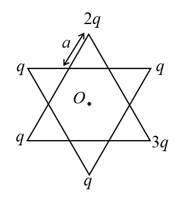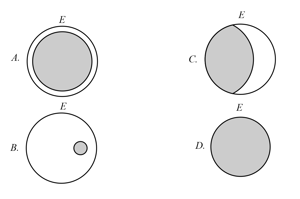Embibe Experts Solutions for Chapter: Electrostatics, Exercise 2: Exercise 2
Embibe Experts Physics Solutions for Exercise - Embibe Experts Solutions for Chapter: Electrostatics, Exercise 2: Exercise 2
Attempt the free practice questions on Chapter 13: Electrostatics, Exercise 2: Exercise 2 with hints and solutions to strengthen your understanding. Practice Book for KVPY Aptitude Test - Stream SA Physics solutions are prepared by Experienced Embibe Experts.
Questions from Embibe Experts Solutions for Chapter: Electrostatics, Exercise 2: Exercise 2 with Hints & Solutions
Two positively charged spheres of masses and , are suspended from a common point at the ceiling by identical insulating massless strings of length . Charges on the two spheres are and , respectively. At equilibrium both strings make the same angle with the vertical. Then
Two equal charges of magnitude each are placed at a distance apart. Their electrostatic energy is third charge is brought midway between these two charges. The electrostatic energy of the system is now?
Two small metal balls of different mass and are connected by strings of equal length to a fixed point. When the balls are given charges, the angles that the two strings make with the vertical are and , respectively. The ratio , is close to
An electric field due to a positively charged long straight wire at a distance from it is proportional to in magnitude. Two electrons are orbiting such a long straight wire in circular orbits of radii and . The ratio of their respective time periods is
A bullet whose specific heat is and moving at plunges into a block of wax whose specific heat is . Both bullet and wax are at and assume that the bullet comes to rest in the wax and all its kinetic energy goes into heating the wax. Thermal temperature of the wax in is close to.
Positive point charges are placed at the vertices of a star shape as shown in the figure.

Direction of the electrostatic force on a negative point charge at the centre of the star is
A total solar eclipse is observed from the earth. At the same time, an observer on the moon views the earth. She is most likely to see (E denotes the earth)

A proton of mass and charge is projected from a very large distance towards an particle with velocity . Intially, particle is at rest, but it is free to move. If gravity is neglected, then the minimum separation along the straight line of their motion will be
